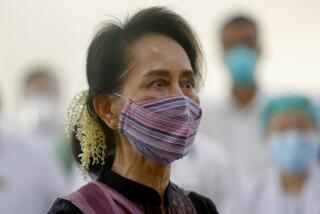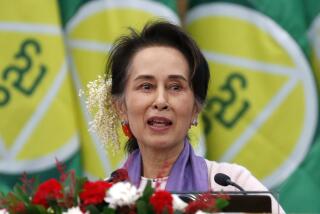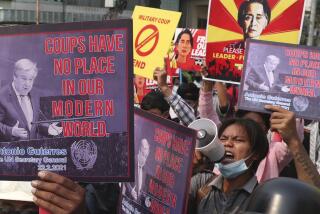Hillary Clinton meets with Myanmar president, Nobel laureate
- Share via
Reporting from Yangon, Myanmar, and Washington — On a landmark visit to Myanmar, Secretary of State Hillary Rodham Clinton on Thursday said the U.S. would ease aid restrictions and consider further steps to improving relations with the country’s autocratic rulers if they continued down a path of political and economic reform.
Clinton described her meeting with Thein Sein, Myanmar’s president, as “candid, productive,” but cautioned that while the “measures already taken may be unprecedented and welcomed, they are just the beginning.”
She said Thein Sein told her during a private 45-minute meeting that he “hopes to build on” a flurry of political reforms that began last year, and to work with the West on halting the illicit spread of nuclear and missile technology.
Clinton spoke during her first full day in the country, also known as Burma, whose government has been subject to ever-tightening U.S. sanctions since it violently suppressed political opposition in 1988. She dined with Myanmar’s celebrated pro-democracy leader Aung San Suu Kyi in Yangon, a scene symbolic of the changes afoot in this poor but strategic Southeast Asian nation.
Both women have expressed a willingness to test the sincerity of the government’s moves toward allowing greater political freedom.
Suu Kyi gave Clinton full support for her diplomatic overture. Speaking by videoconference to the Council on Foreign Relations in New York, Suu Kyi said she trusted Thein Sein, but warned that others in the government were not equally committed to reform.
“I cannot say everybody in the government feels as he does,” she said. Even so, she said the time was right for Clinton’s visit, because “both countries want to improve relations.”
In recorded comments to the Chatham House think tank in London, Suu Kyi said “it is worthwhile to take the risk, to accept that there is a possible opening. If we wait only for solid guarantees, we can never proceed.”
The trip carries political risks for the Obama administration because of skepticism in Congress and among human rights advocates that the regime will ease its repression. Clinton said the administration would require more substantive progress, including the release of more than 1,000 political prisoners, before it would consider fully restoring diplomatic relations or lifting stiff economic sanctions.
Several analysts said Clinton’s meeting with Suu Kyi, the most lauded dissident since Nelson Mandela, was likely to be a public relations winner.
They held their first meeting at the lakeside home of the ranking U.S. official in Yangon, where, in addition to sharing dinner, they talked about their lives and about Suu Kyi’s plans to run for the parliament.
“I am very happy to meet you, finally,” said Clinton, who described the Nobel Peace Prize laureate as a personal inspiration. The two were scheduled to meet again Friday.
But despite the encouraging language from Thein Sein and Suu Kyi, the government did not organize large-scale public events for Clinton, apparently reflecting the elite’s ambivalence about a diplomatic thaw with a longtime adversary.
A senior U.S. official similarly downplayed the U.S. efforts Thursday as “modest” diplomatic gestures. But they signified the kind of international acceptance that Washington can offer Myanmar if reforms continue, the official said.
Clinton warned that it would be hard to “begin a new chapter” until Myanmar moved toward peace with ethnic minority groups and allowed humanitarian groups and independent monitors into conflict areas.
U.S. officials said Myanmar’s leaders are “strongly considering” allowing inspections by the International Atomic Energy Agency, the United Nations’ nuclear watchdog, to allay fears that they have obtained nuclear technology from North Korea.
Clinton invited Myanmar to join the Lower Mekong Initiative, a regional association that tackles water issues. She proposed that the United States and Myanmar work jointly to recover the remains of 600 U.S. soldiers who died in the country during World War II. The search for the remains of U.S. troops in Vietnam ultimately led to rapprochement between the two former enemies.
Analysts said the long-term question is whether the military can control the pace of reform or whether it will be forced to give up power to the civilians.
“It’s a tricky task the Myanmar generals have set for themselves,” said Gareth Price, head of the Asian program at Chatham House in London. “It’s not going to work in the long term.”
Special correspondent Coonan reported from Yangon and Times staff writer Richter from Washington. Staff writer Mark Magnier in New Delhi contributed to this report.
More to Read
Sign up for Essential California
The most important California stories and recommendations in your inbox every morning.
You may occasionally receive promotional content from the Los Angeles Times.











